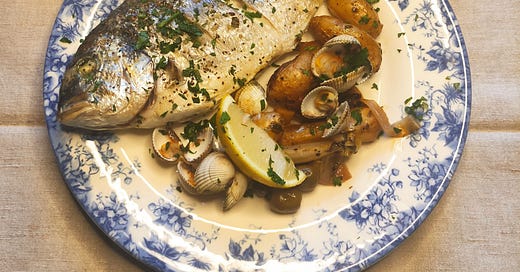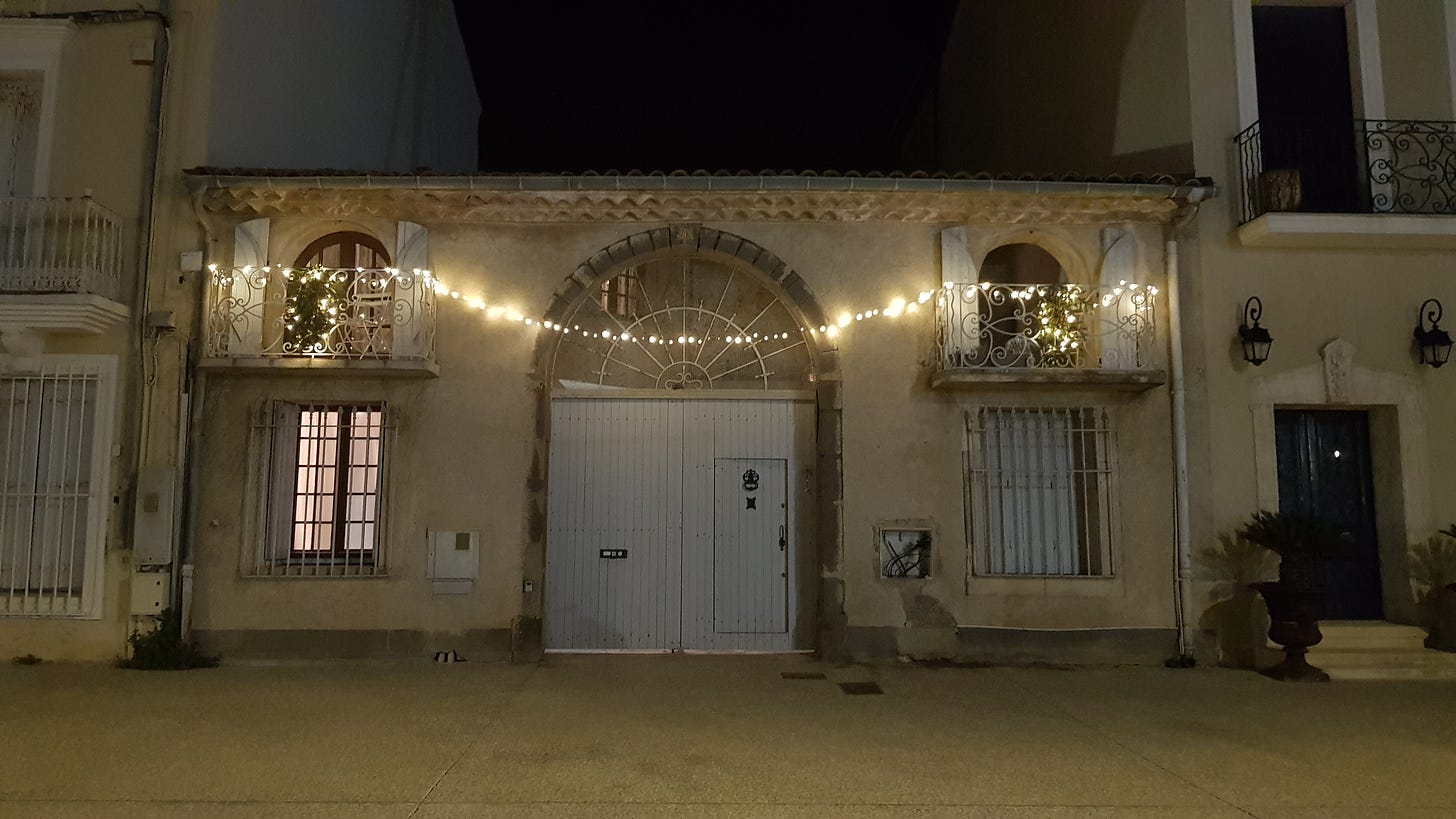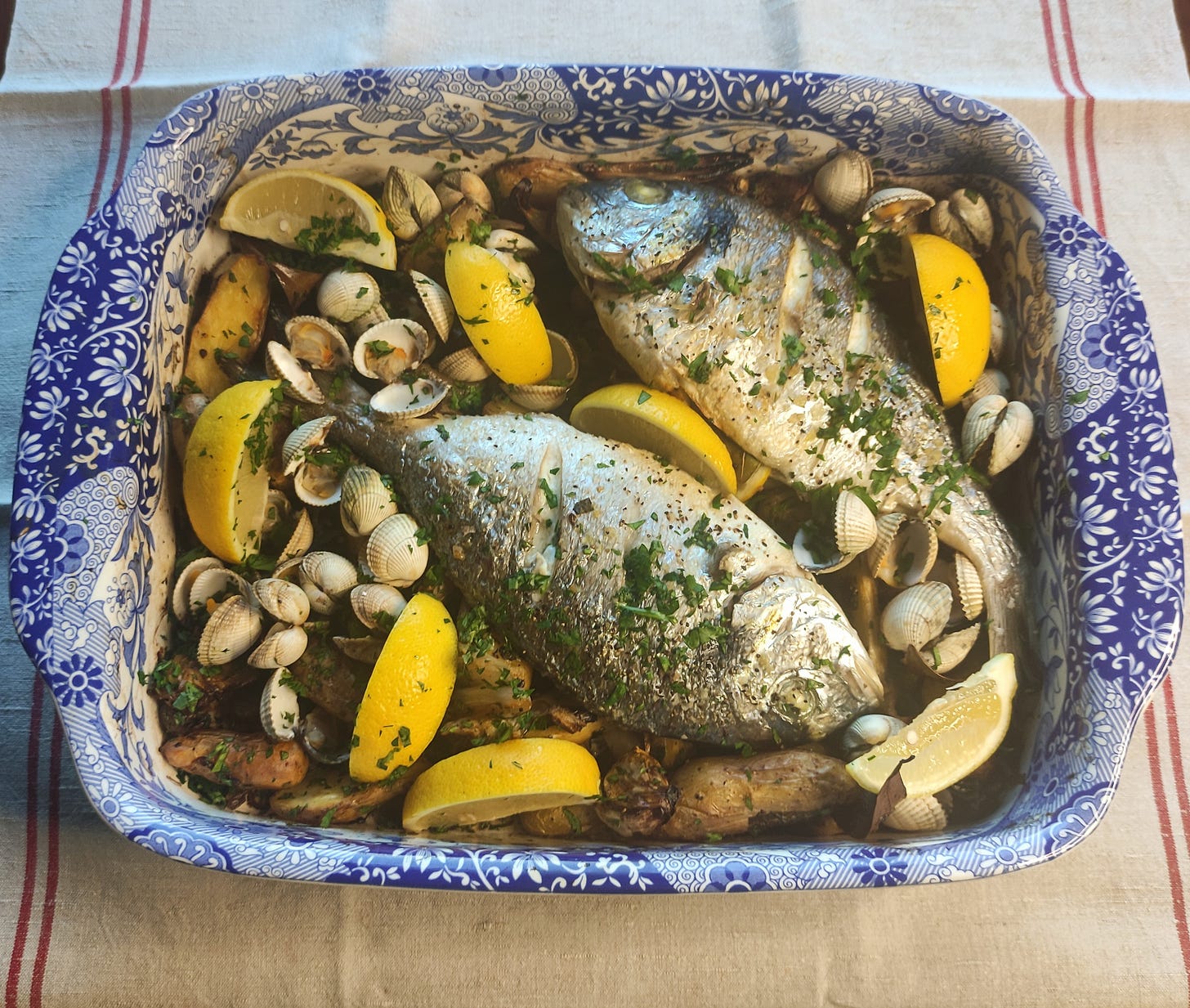French Christmas? No problem
How moving to France helped me banish perfectionism and reignited my love of Christmas, plus a recipe for whole fish baked with potatoes and olives.
I love Christmas. When we lived in London, at the beginning of November, I’d pull out my recipe books and old December issues of food magazines and get busy with my Post-It notes, scribbling down ideas, saving Google searches, hunting inspiration to make each Christmas better, more delicious, more original than the last.
From the beginning of December, I held drinks parties and dinners, festive weekend lunches and made food presents to give to our friends, family and neighbours. Every year, I piled new traditions on top of old ones. Then, come the great day, I was never happy unless we had at least a dozen round the table, best china, silver and glassware sparkling like a thousand stars. We always had the biggest tree available outside of an ancient Norwegian pine forest and a (homemade) wreath the size of a car tyre on the front door.
By the time New Year rolled around, I was as deflated as a month-old balloon.
Our first French Christmas in 2020 could not have been more different. We didn’t live here then. We’d been here for four months, intending to leave for England in the middle of December. Then – quelle catastrophe or, perhaps, not – we realised at the very last minute that one of the dogs’ rabies vaccinations was out of date. He needed a new shot and then couldn’t travel for a further three weeks, which brought us up to December 28.
So for the first time in my life, I had no plans for Christmas. Mother Claus relinquished her apron. We bought some fairy lights from the supermarket and strung them over the balconies of our rented house, then went to the market in Pézenas and spent an eye-watering amount on emergency, compensatory cheese.
One morning in early December, I opened the bedroom shutters and Mickey Mouse was staring back at me from the middle of a carousel.
On Christmas morning, we woke to the sound of the church bells ringing out over the village and took the dogs for a walk on the beach. We sat on a log, drank glasses of Buck’s Fizz and coffee from a thermos and watched the waves. In the afternoon, we went to lunch at some friends who live about an hour north of Marseillan and ate food they had planned, cooked and served. I hadn’t touched a Post-It note in weeks and yet somehow we’d still managed to mark the birth of the Baby Jesus in an appropriately celebratory manner.

By December 2021, we were living here. Everybody’s rabies shots were up to date. We were preparing for our first proper French Christmas. Our friend was coming from Italy and at the last minute, my sister- and brother-in-law announced they would be arriving on Christmas Eve. I had made very few plans. Stir Up Sunday was now something that happened only on The Archers.
One morning in early December, I opened the bedroom shutters and Mickey Mouse was staring back at me from the middle of a carousel. The Christmas fair had arrived in the square overnight. The port and the village began to twinkle with Christmas light.
It felt very much like Christmas was coming to us, whether we were prepared or not. We bought a big tree and I tied some of the cut off branches with ribbon and hung them on the front door, in place of a wreath. I didn’t even get my glue gun out. We dug out the four metre-wide Christmas pudding decorations we used to hang on our house in London and hitched them onto the scaffolding which now encased the house. My French neighbour Gabi dropped by to tell me people appreciated them. I asked if they knew what they were and she said, “No, not a clue, but they appreciate them anyway.
What if, breaking the tradition of a lifetime, I just bought it all in?
I was just beginning to think about what we might eat, when one day in the butcher’s I spied their Christmas menu on the counter. I read it as closely as A Christmas Carol. Not only the expected offerings of goose, turkey and capon, but a host of starters and side dishes, fait à la maison, too. What if, breaking the tradition of a lifetime, I just bought it all in? Tick, tick, tick, I went down the list: pâté en croûte, goose stuffed with chestnuts, dauphinoise potatoes… At the cheese shop, I ordered a platter of cheeses and at the seafood shop, a big plate of oysters, already opened for extra ease. From the bakery, I ordered a bûche de Noël, the black forest one filled with cherries and kirsch.
And here was the ultimate test, for a control freak like me: it could all be picked up on Christmas morning. What if this was an elaborate joke on the new English person? Would they all really be open? And if not, is toast a suitable Christmas lunch for a food writer to feed her friends and family?
In France, Christmas Eve is traditionally the time of the big meal. Sometimes it begins after midnight mass, a multi-course affair which continues into the very, very small hours, though some people now move the big meal to Christmas Day better to accommodate the very young or the very elderly. It’s largely a family affair, in a country where family is everything. A lot of the foreign nationals I know in this very international corner of France organise their own “waifs and strays” Christmas meals, where trestle tables are retrieved from garages and chairs are brought down from bedrooms and lofts to accommodate as many as half a dozen languages around the festive table.
I messaged my Norwegian neighbour, Marie, who’s lived between France and Norway for many years. What were the differences she noticed between Christmas in France and Norway? “Hold on! I’m coming round” she replied. Then she was at my gate, holding a shopping bag stuffed with lamb chops. These were no ordinary chops. “My friend just sent me them from Norway, a special Christmas thing – pinnekjøtt.” Pinnekjøtt are salt-cured lamb ribs and the name literally means stick meat, traditionally served on Christmas Eve with root vegetable mash. We drank coffee and she described the Norwegian festival of dinners and lunches, pork ribs and steamed cod, beer, gløgg and aquavit, rice pudding with whipped cream, pepperkaker (ginger biscuits). “It’s really become a food party in Norway, and all about gifts, gifts, gifts. It’s very cosy and nice, but it can be a bit much honestly.” What does she like about Christmas in France? “The oysters and foie gras, the champagne, it’s all very elegant, and then it’s over.” It certainly sounds a lot less mediaeval merchant than stick meat and mashed roots.
Christmas cards aren’t a big thing here. My English friend Vic, who has lived here for four years, describes the slightly wary shrug her neighbours gave her when she went round with a card for them. “I ended up feeling a little embarrassed, as though I’d done something inappropriate. They are very nice people, but it was clearly not the done thing.”
In my first year, I tried to find some nice cards to send to our family and friends but most of them looked like they’d been dug out of a dusty warehouse, possibly after a major roof collapse. It’s interesting that the smartest ones I’ve found in local boutiques and on market stalls have English greetings on them, possibly to appeal to the French who like English slogans on their sweatshirts, but more likely because they’re intended for the English-speaking community in the village.
In London, I used to send about a hundred cards, setting aside two or three evenings to write them all out, inscribing each one with a personal message. Here I write very few. And you know what? Nothing happens. No one cares.
Last year, because I can’t help myself, I made a huge batch of mincemeat, extra boozy, from which I made dozens of mince pies. I gave them out to the people and businesses who had helped us to settle in and feel at home. I experienced the same puzzlement that Vic did with her cards – they seemed glad to receive them, but what for? In January, our estate agent greeted me with a cheerful “Thank you for the mincey pies!” I’m not sure I will repeat the experiment this year.
What I’ve learned from living in France, particularly from our Christmases here, is that we can set the perfectionism bar very high for ourselves, and if we fail that test, usually we are the only people to notice. What if we just decided not to do the “perfect” Christmas? What if we cut down on the cards and the gifts and the overwhelming amount of food and drink, and just focused on the aspects of the festivities we really enjoy, such as spending time with our families and friends, watching movies, taking walks, sleeping late, whatever the fun part of the Christmas holiday looks like for you?
There are no rewards in heaven for being the one awake at 3am peeling five kilos of spuds. “From scratch” does not guarantee Santa Claus will drop down the chimney with that coat you’ve had your eye on, and neither does buying everything in, or ditching the parsnips or sprouts because you can’t be bothered, ensure your stocking will be full of coal. What I am left wondering - a profoundly subversive thought - is that a good enough Christmas might just be the very best Christmas of all.
PS All of the shops were open on Christmas morning, so we took a walk, collected all the components of lunch, chatted with neighbours, and stopped for hot chocolates at The Marine Bar. No sweat.
Sea bream with potatoes and olives
This is an easy way of making fish for a group of people without any last minute faff. You can use four smaller fish, one per person, or two larger ones and fillet them at the table. Cooking the fish on the bone helps retain moisture and flavour. I made this with bream, but you can also use sea bass or any similar white fish. I used Ratte potatoes, but any small potatoes such as fingerlings of Charlottes would be perfect.
Keep reading with a 7-day free trial
Subscribe to Lickedspoon with Debora Robertson to keep reading this post and get 7 days of free access to the full post archives.







